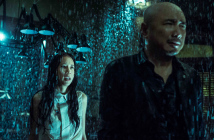
Editor’s Notes: Midnight Special is currently out in limited theatrical release.
A shabby motel room, the windows covered in cardboard and duct tape, a young boy hiding under a bed sheet, his eyes covered by goggles, his ears wrapped in industrial-strength headphones, and two older men, who claims he’s the boy’s father and the other who’s there’s as friend, protector, and the father’s partner. The men, Roy (Michael Shannon), and Lucas (Joel Edgerton), share the coiled, tense body language of men desperately running from something and quite possibly running toward something. Before long, they’re on the road, leaving the motel behind in the predawn hours, desperately attempting notice before they reach their next stop, their next destination, whatever and wherever that might be in writer-director Jeff Nichols’ (Mud, Take Shelter, Shotgun Stories) fourth film, Midnight Special, a frustratingly middling, uneven feature-length homage to Steven Spielberg’s Amblin period of the late ‘70s and early ‘80s.
. . . a frustratingly middling, uneven feature-length homage to Steven Spielberg’s Amblin period of the late ‘70s and early ‘80s.
That opening, full of mystery and doubt, sets the stage for Nichols’ approach to narrative, carefully – some might argue too carefully – doling out bits and pieces of exposition as Roy, Lucas, and the preternaturally, paranormally gifted Alton (Jaeden Lieberher, St. Vincent) flee through the backwoods and byways of Texas and Louisiana. Almost immediately, an encounter between the two men and a state trooper ends almost tragically. It’s clear the two men, especially Roy, will do practically anything to evade capture, up to and possibly including murder. Given Shannon’s well-earned reputation as Mr. Intensity, it’s remarkably easy to believe Roy will do everything to ensure Alton’s survival, even if the real world, represented in Midnight Special by the twin pillars of American authority and authoritarianism, the church (here more a Christianity-inspired religious cult) and the U.S. government (represented here by a confluence of the military, the FBI, and the NSA).

As Roy, Lucas, and Alton drive (and drive), resting during the day, in part to go unnoticed, but also to protect a gradually weakening Alton whose powers, whatever their origin, involve beams of blue, beatific light emanating from his eyes and the occasional, localized earthquake, Midnight Special expands in concentric circles, initially taking in the Ranch, a religious cult headed by Calvin Meyer (Sam Shepherd) and Alton’s adopted father. The cult sees Alton as a literal messiah figure, a savior who, on the appointed hour and day (March 6th), will lift up the true believers into the equivalent of heaven. Moments after Calvin counsels two men, figurative doubles for Roy and Lucas, on the necessity of retrieving Alton before the appointed day, the FBI swoops in, ushering the men, women, and children of the Ranch into buses for interrogation about Alton. A young NSA officer, Paul Sevier (Adam Driver), becomes the point person for the U.S. government’s pursuit of Alton. Not surprisingly, the U.S. sees Alton as a potential threat, not a savior, but Sevier – refreshing depicted not as a villain, but simply a truth-seeker (he’s also the audience stand-in) – begins to suspect otherwise.
Midnight Special expands even further to take in Roy’s estranged wife and Alton’s mother, Sarah (Kirsten Dunst), who joins them on the journey. As the only woman in a major role (often the only woman in Midnight Special at all), Sarah serves as a reassuring, albeit traditional, maternal presence, defined wholly by her relationship to Alton and Roy. It’s one of Midnight Special’s most glaring weaknesses, but it’s not the film’s biggest problem, a third act filled with too many over-familiar ideas, ideas bordering on cliché, and a climax that lacks the punch and poignancy, not to mention the wonder and awe Nichols wants to impart to audiences, wonder and awe typically associated with the early phase of Spielberg’s career, especially (and specifically Close Encounters of the Third Kind and E.T.: The Extraterrestrial), with added references to John Carpenter’s Starman and M. Night Shyamalan’s Unbreakable (not coincidentally, Shyamalan was once heralded as Spielberg’s successor).
Ultimately, Midnight Special might be a perfect example of Nichols the screenwriter failing Nichols the director.
Ultimately, Midnight Special might be a perfect example of Nichols the screenwriter failing Nichols the director. For all of his technical proficiency, a proficiency that bodes well for directing mainstream films in Hollywood (assuming his ambitions lie in that direction, of course), Nichols fails to elevate Midnight Special beyond a seemingly endless series of references, quotes, and citations from early Spielberg. Shots and scenes echo with narrative and visual cues, primarily from Close Encounters of the Third Kind, everything from government conspiracy to the ubiquitous helicopters that constantly circle ahead, to the coordinates of the super-special meeting place where Alton’s destined to go, to Alton’s weakening condition (E.T.: The Extraterrestrial), to the literal uplift of the climax, and on and on (Starman also shares many of the same plot points and emotional beats). By the final moments of Dave Wingo’s score, it becomes just as clear that Nichols took the “it’s the journey, not the destination” line to heart. More often than not where fictional narratives are concerned, it’s both.
Ultimately, Midnight Special might be a perfect example of Nichols the screenwriter failing Nichols the director. For all of his technical proficiency, a proficiency that bodes well for directing mainstream films in Hollywood (assuming his ambitions lie in that direction, of course), Nichols fails to elevate Midnight Special beyond a seemingly endless series of references, quotes, and citations from early Spielberg.



